Shares in Vertu Motors (LSE: VTU) fell 2% this morning despite first-half profit before tax rising 29.4% to £24.4m.
This figure was boosted by a £4.1m exceptional profit on the sale and leaseback of property. Even if we strip this out, operating profit rose 3%, so why is the market valuing Vertu at only 7.6 times earnings?
Firstly, car dealerships are pretty low margin businesses. Even including that property sale, operating profits were only 1.7% in the first half.
Another important factor is the fall of sterling since Brexit was announced, leading to a significant rise in the price of new vehicles. This, combined with concerns about the economy, is impacting new car sales significantly.
The company points out that “UK new vehicle private registrations in September 2017 were down 8.8%” while “the group’s September like-for-like new vehicle retail volumes fell by 14.8%”. Its no wonder the market isn’t enamoured with Vertu right now.
If you’ve got the stomach for it however, I believe this negative sentiment could represent a buying opportunity. That’s because Vertu doesn’t make the majority of its cash from new car sales, but from fixing up older ones in its after-sales department.
A reduction in new cars increases the average age of those on the roads, and older machines require more TLC to keep on trucking. Aftersales like-for-like sales grew 4.4% in the first half and I expect this could continue.
What’s more, Vertu’s has grown to be one of the largest UK car dealerships in roughly a decade via a solid acquisition strategy – and I believe it can continue to consolidate this fragmented market to great effect for shareholders.
Could the shares double by 2019? They were valued nearly 70% higher before Brexit, so if sentiment improves it is distinctly possible, especially given the solid acquisition strategy.
A revitalised retailer
Due to a rapid expansion and wonderful capital allocation history, investors used to view Next (LSE: NXT) as an upper-echelon retail stock, but dampened high-street footfall and rampant online competition has soured sentiment towards the company.
The question facing Next, then, is can the very best retailers thrive in a world of online shopping, or is the bell tolling for all brick-and-mortar organisations?
The company’s first-half results came in at the cautious end of expectations, with a 5.7% jump in Next Directory sales failing to offset the ailing retail stores division, where sales fell 8.3%. In total, the group’s revenues declined 2.2%.
The large fixed cost base meant that a relatively small sales decline hit store portfolio profitability to the tune of 33%. Ouch.
This is clearly a pressing issue, but at least management isn’t burying its head in the sand. They company said it has “taken a long hard look at the future of our Retail business.” After stress testing, it claims the stores could still produce £1bn cash even if sales fell 57% over 10 years.
This worst-case-scenario estimate includes no reduction of rent costs, which also seems unlikely given the falling value of high street property. Within 10 years, 72% of the company’s leases (by value) will have expired and I believe it will be able to negotiate lower rent costs.
In conclusion, I sincerely doubt Next shares will double any time soon, but I still see value in the business in the long term. The company trades on about 12 times the consensus earnings estimate for this year, which seems a fair price to me.








